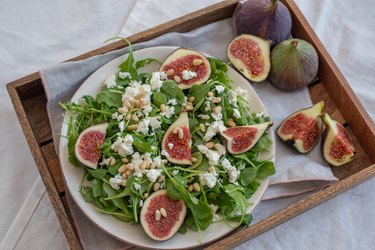
Foods rich in vitamins and minerals are an essential part of leading a healthy lifestyle. Examples of vitamins found in food include vitamins A, B, C, D, E and K, while minerals include fiber, phytochemicals and potassium.
Tip
Examples of vitamins and minerals in food include fiber and phytochemicals, along with Vitamins such as A, B, C, D, E and K.
Video of the Day
Examples of Vitamins and Minerals
The Academy of Nutrition and Dietics recommends eating nutrient-dense whole foods rich in vitamins and minerals, rather than taking dietary supplements. Taking a nutrient out of a food and concentrating it in a pill isn't quite the same as eating whole, unprocessed vitamin- and mineral-rich foods. When you don't eat enough vitamins or minerals, negative health results can occur.
Video of the Day
According to the 2015-2020 Dietary Guidelines for Americans, "Nutritional needs should be met primarily from foods. Individuals should aim to meet their nutrient needs through healthy eating patterns that include nutrient-dense foods ... [which] contain essential vitamins and minerals and also dietary fiber and other naturally-occurring substances that may have positive health effects."
Additionally, eating for energy by filling your diet with B-complex vitamins and vitamin D is effective for preventing fatigue and enhancing healthy energy levels. The mineral iron, an essential part of hemoglobin, is the substance in the blood that carries oxygen to the rest of the body.
Read more: A List of Vitamins and Their Uses
Examples of Vitamins in Food
The Mayo Clinic also suggests that consuming whole foods, such as fruits, vegetables, grains and dairy products, has benefits that aren't found when taking supplements in the form of a pill. These benefits include greater nutritional value, in that whole foods contain a variety of nutrients, such as vitamins and minerals, that your body needs.
Fiber, for example, is important for digestion and may help prevent certain diseases. Soluble fiber found in beans, some grains, fruits and vegetables, and insoluble fiber found in whole grains and some fruits and vegetables, may help prevent heart disease, diabetes and constipation.
Eating foods with lots of fiber helps reduce total and LDL ("bad") cholesterol, improves blood sugar control and prevents constipation. Consuming high-fiber foods may also help with weight loss, as they tend to make you feel full. Opt for brown rice, bulgur, barley, oats, nuts, beans, lentils, apples, blueberries and carrots.
Read more: Taking Vitamins Before or After a Meal
Rich in Vitamins and Minerals
According to Harvard Health Publishing, taking vitamin or mineral supplements isn't as beneficial as when the nutrients come from food sources. Vitamins are organic substances found in plants and animals, while minerals are inorganic elements from the earth. Vitamins and minerals are essential for normal growth and optimal health.
For an increase in iron, eat meat, poultry, fish and beans. For Vitamin A, try carrots, sweet potatoes, spinach and kale. Meat, poultry and fish are good sources of Vitamin B12, while nuts, seeds and vegetable oils are helpful for Vitamin E.
Phytochemicals found in some fruits, vegetables, whole grains, legumes and nuts may have a positive effect on health. Eating a diet rich in phytochemicals has been associated with a lower risk of chronic diseases, such as cancer and heart disease. To increase flavonoids, eat blueberries, raspberries, strawberries and blackberries.
To increase your intake of carotenoids, try orange vegetables such as carrots, sweet potatoes, and winter squash. Tomatoes contain lycopene, while soy foods such as edamame or tofu contain isoflavones. Resveratrol can be found in red grapes, while health-boosting catechins are found in many teas.
- Academy of Nutrition and Dietics: "Vitamins, Minerals and Supplements Do You Need to Take Them?"
- Mayo Clinic: "Vitamins and Minerals What You Should Know About Essential Nutrients"
- Harvard Health: "Best Source of Vitamins, Your Plate not Your Medicine Cabinet"
- USDA: "2015-2020 Dietary Guidelines for Americans"
Was this article helpful?
150 Characters Max
0/150
Thank you for sharing!
Thank you for your feedback!